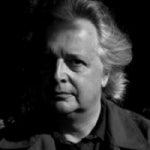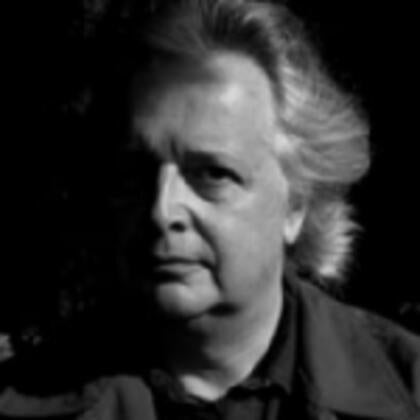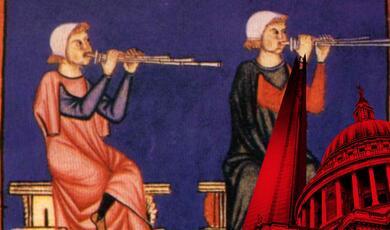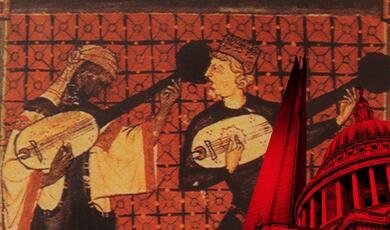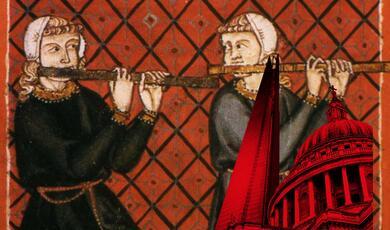The Composer as Teacher
Share
- Details
- Text
- Audio
- Downloads
- Extra Reading
Hindemith and Messiaen seem gladly to have done it; Schoenberg latterly had to do it for money; 'those who can't' are said to fall back on it, but most composers who 'can' have to do it too. Are composers the best people to teach their art? This event will view different approaches by practitioners in the field.
Download Text
The Composer as Teacher
Professor Piers Hellawell
"In England , historically, there was no composition being taught. Now I perhaps feel that there is too much. (1)”
Those are not my views but those of Sir Harrison Birtwistle, given in a recent interview. We can only speculate as to the nature of his concerns about too much composition teaching, but he may feel - these are my prejudices here - that the encouragement of school-age compositional activities in themselves is of limited benefit unless these are accompanied by serious disciplines and training. But then he may not: he is merely underlining huge changes in the training of this country's composers. The modern landscape would be unrecognisable in its priorities, for example, to a student composer of 100 years ago.
We may also pause to wonder what Birtwistle meant also about the other part of his assertion - about too little teaching in the past. My impression, at a time when traditional technical training is less in fashion than ever, is rather different: we shall see that there was less - if any - emphasis on nurturing individuality, and no doubt composition was not yet self-conscious as a training 'cause' (after all, the umbilical chord to the audience was not yet so endangered as to turn the practice in on itself), but I'd be surprised if there was actually less of it; as we shall see, training took another form.
The modern teaching of composition is the latest stage in an imperceptible process of chemical separation between the study of music and the pursuit of composition, where once they were part of a greater unity, if not synonymous. When music was a contemporary phenomenon, unburdened by historical perspective, to learn about music was largely to learn how to make it. It is true that great individuals since the 16th Century have undertaken reverent study, whether Mendelssohn of Bach or Beethoven of Handel, but the basic training in musical rudiments in, say, the 18th Century would surely have dwelt upon unselfconscious composition tools in the guise of what we as students called 'harmony & counterpoint'.
I turned for evidence to a popular treatise of the early Romantic period, William Crotch's Elements of Musical Composition. In the Preface we read (2)
"A knowledge of the elements of musical composition is happily indispensable... to a musical education",
an opening assumption that would be incomprehensible in the modern context. Yet Crotch is not unaware of artistic context, for he admits that
"the rules of counterpoint are not given, as they seem to have become obsolete."
Notwithstanding, he gives copious space to canonic writing and examples. Yet it is the contemporaneous context of his technical training that is striking: this is not a history lesson, and indeed the student might not have had reliable access to, say, the sacred vocal music of 200 years previously, as today's students will study a 'period'. Remember how Mozart himself only heard the Miserere by Grigorio Allegri in its sacrosanct church setting, and famously transcribed it by memory from a single hearing.
Two things happened in, I think, the 20th Century: one was an increasingly defensive stance on the part of new music prompted by the crisis in ownership that we discussed in last year's sessions, a crisis that inevitably relegated composition to a more rarefied and arcane pursuit; the other was the final emergence (already underway in the 19th Century) of that historical perspective that meant the end of unselfconscious composition skill - a sense of the past, an awareness of inevitable development (what Schoenberg called 'historicism') and, in consolidation, the rise of historical musicology as the study of that past.
This latter snowballing archaeology has to a degree appropriated for historical study the tools that once we took up as a foundation for composing the music of the future - a major, and some may feel a disastrous, shift in the role of technique.
EX Haydn: Quartet op 20 no 2 (iv)
Though an understanding of how fugal entries work is essential to the deep appreciation of Haydn's Quartets, it was until quite recently taught as a useful basic literacy for tomorrow's composer, regardless of what he or she might write. It is as if correct syntax in prose – another literacy in crisis today, of course - it is as if correct syntax had come to be seen as part of studying the great literature, rather than as a training for serious writers. Soon it may well be so. The legacy of this process in music has paradoxically been an exaggerated sense of present, a paranoia about contemporary 'relevance' (which is almost always transient, having lacked the bedding process of time) - and hence the marginalisation of those techniques that evidence the past. In fact I would argue that it is the very irrelevance of 'archaic' technique (3) that marks its importance: only because it is outside this or that current practice does imitative counterpoint, for example, constitute a universal training tool. Sportsmen do press-ups, but I am unaware of a team sport that involves competitive press-ups - in fact they are not 'relevant'.
My interest in this huge shift in music study led me to seek a wider perspective of what has happened to it in this country. As a distinguished practising composer, Professor Raymond Warren has held many offices, among them the Hamilton Harty Chair in my own institution, where I am now in charge of composition. He confirmed (4), from his own experience as a Cambridge undergraduate in the early 1950's, both the subsequent decline in archaic composition techniques and the effect of historical musicology on the curriculum, resulting in the increasing 'specialisation' of composition.
Firstly, he confirmed that the percentage of practical skills in the degree was much greater as late as the 1950's, with a corresponding dearth of the historical context that is taken for granted today. Within this status quo, therefore, training in the writing of 'fugue' - as opposed to comparing Bach's fugal language with that of his contemporaries - was a pursuit in itself, like the study of calculus or perspective. It would have been accompanied by canonic and tonal harmony exercises, just as it had been in Crotch's 1830 Treatise, so that the student emerged with a strong practical expertise (albeit an arcane one) that was at most only loosely anchored to specific repertoire. This perhaps suited a choir master/ organist, or a school music-master conducting orchestras and teaching harmony.
In effect, these technical studies were then the 'core' orthodoxy, a role now occupied by historical study. When did the baton pass from one to other as central component, I wondered? Clearly it was a gradual shift, but Raymond Warren identified a significant cornering in the late 1940's, a point where study began to be specific to historical example: he recalled for example Thurston Dart's role at Cambridge in locating canonic study in Morley's Canzonets. With this apparently innocent move, abstract training was becoming refocused upon historical reality, beginning the appropriation of technique to historical study: my institution's own name for such studies, 'Technique & Style', perfectly expresses the new alliance. We shall see that this was not to be altogether bad news for composition as a vocation, nor in my view bad news overall - but it marked the turn of the tide for abstract technical training. Clearly, the shift in itself in no way heralded the end of technique-based work: in Oxbridge in particular, study of abstract disciplines has continued to this day, along with more recent historical contextualisation. Back in the 1950's, furthermore, the curriculum had changed little on the surface, remaining largely occupied by with technical study whatever the new strains in thinking. Nonetheless, when I was in Oxford in the 1970s, our exercises in Baroque and classical harmonization and counterpoint were worked as pastiche completions of originals – in other words our struggles were directed to learning about composers' languages, rather than toward abstract goals: 'technique & style' was indeed the substance.
We can be clear then that in the years up to the war, the advanced training of a thinking musician was strongly geared to skills in composition, part of a tradition stretching back much further than the age of that manual of 1830. Equally clear, however, is that this was academic composition - abstract and archaic rather than work in a developing personal style with (or without) its own rules. No mention has been made of personal nurturing and of 'access'- the guidance of the young composer.
Whereas composers like me are now fostering the individuality of youngsters who lack much core training, the reverse was true as recently as the 1950's: potential composers received that strong training but no official encouragement toward personal development. Professor Warren confirmed to me that conscious 'composition teaching' was then as invisible as the core technical training was prevalent; he recalled being given private coaching about some songs from his tutor Boris Ord, but it was absolutely on an unofficial, rather than a curricular, basis.
Composition was far from being a self-conscious component of the curriculum, however much it was practised by proxy. In fact 'free' composition (writing your own pieces in your manner) might not have been understood as teachable by the great figures of the time, a view that persisted into the 1980s, when I used to be asked at job interviews 'can one teach composition?' This approach, which I have always deplored as meaning 'one can't teach it so we can safely ignore it', became established as a deafening silence in the curriculum that was uniquely English. 'Come-and-have-tea-and-we'll-talk-about-your piece' was barely an improvement: in this grudging variant an untrained student was sent off to write without supervision, before getting from a peer figure a piece of fruit cake and a few remarks of subjective response that masqueraded as teaching. In my view things cannot get much worse than this; when Birtwistle says 'arguably there is now too much teaching' we should remember that some of it may still be like this. While it is fine to treat experienced graduate composers thus, it is no basis for undergraduate composition. In the late 1980's I was joined by Kevin Volans, a colleague fresh from Stockhausen's advanced circle of young composers; on arrival he shocked the rest of us by his European perspective that composition training was a 10-year programme that began with writing long series of black dots - square one, as it were. After a few weeks of this I had to intervene to point out that the class would have to produce a portfolio in a matter of weeks... I tell this story against ourselves, rather than against a treasured colleague, to show how widely our amateurish assumptions about training differ from the rigour of the European outlook.
I said that the earlier refocusing upon history was not entirely bad news for composition - for perversely, the decline in techniques has also seen the rise in individuated composition, a kind of seesaw development. I now have 70 composition undergraduates, few of whom could write a decent tonal canon, though many have the ability to learn. This rise in numbers of 'composers', being hailed as a blow for 'access', is the corollary of a decline in numbers taking counterpoint, keyboard skills and the higher AB theory exams. Perhaps - whisper it in secret - students actually want disciplined frameworks of study... In a way the decline of what I believe are necessary skills has made room in the curriculum for the composition for which they are really a prerequisite. Thus whereas the horse was once given stable-space over the cart, we now stable cart rather than horse, a dubious priority in transport terms. I must say I would love to see the two harnessed up in proper order, with abstract rigour preceding, then handing over to, individual development. That we do not enshrine such a complete training is perhaps part and parcel of the marginalisation of art and artistic training in the UK . It is certainly a shame if we cannot have both, but then there is now also historical musicology to accommodate – the new, rich and extremely fat kid on this particular block.
My see-saw metaphor for the ebb and flow of technical and free writing suggests that at one point they would have been level. In fact, something different happened in the 1980s, I believe: for a time both were, in fact, obscured by the wildfire spread of historical study, driven by the new oxygen of 'student choice'. Composers in UK universities at the time of Keith Joseph's 1986 exercise in rating university research (the first of what is now the RA Exercises) will recall finding themselves effectively locked out of their own world, that of academic music training, by the bogus and back-to-front debate of the time, 'is composition research'? This question was debated for 10 years because the new Thatcherite mechanisms for assessing our output as scholars reasonably assumed that universities produce 'research’, departments of music among them. This produced the reasoning: If you compose within this research system, your output must be equated with research to be of quantifiable value. The fallout from this breathtaking volte-face as to the nature of musical training is still with us today, in the need for any composer seeking research funding to 'couch' the work in terms of a research project. In other words, the rules are now made up even in the arts sector by researchers, and those actually creating art have to align themselves with the framework of research into existing examples of that art. To a trained musician of 100 years ago this scenario could only have come from the pen of Dean Swift, but there it is.
In the 1980s, undergraduate composition was in my experience tolerated rather than eagerly promulgated - my curriculum then allowed a portfolio for final year students, but no initial training - while the old skills, on the other hand, were already attracting fewer, and less well prepared, students. The new kid on the music-department block had its feet firmly under the table by this time, despite the fact that most musicologists had spent much of their careers teaching 'H & C', those abstract composition techniques now under threat. This apparent vacuum was of course filled with a rapid diversification in available historical studies, with musicologists being encouraged toward 'research-led' topics. My own teaching duties in the 1980s, for example, did not include composition, but centred on classical history and study of composers via pastiche and the technical studies now ‘applied’ to period studies - while musicologist colleagues were offering contemporary Polish music and cori spezzati in Renaissance Venice. I did not initiate my first-year composition induction until 1989, when it drew around 12 students; it now has 42. A watershed had been crossed - perhaps neither good nor bad in essence, but a profound transition.
In summary, then, we have seen the evolution of music study in the UK from a regime of abstract manipulation to a historically informed diet that was initially unwelcoming to 'free' composition but was destined to bow to cohabitation. For an apprentice composer in recent former times the individual component was at best informal mentoring given on a platform of rigorous technique, while today it is likely to be more rigorous mentoring, on a platform of uncertain technique. This brings me to the other upheaval in the training of composers. The shifts in institutional practice, profound though they have been, may yet be a mere image of wider developments in what composition has become. For these shifts in training have run alongside a far greater change in the nature of art composition, that I explored in last year's series.
I dwelt in much detail last year upon Theodor Adorno's notion of 'individuation' in composition - the breakdown in a universally owned vocabulary, and consequent departure of composers into individual and uncharted territories which audiences proved reluctant to explore with them. We spent time looking at Schoenberg's thinking behind his substantial role in this, but most significant was the idea that from this point onward, every work of art occupied a unique territory. So in my first talk last year we heard from Adorno (5) the idea that the earlier composer could at any juncture make infinite choices, because within such stylistic bounds this would make no difference. Specifically, for example, according to Adorno,
"Most compositions by Mozart would offer the composer far-reaching alternatives without sacrificing anything."
By contrast, if you remove that framework of stylistic convention, then
"Schoenberg's compositions are the first in which nothing can actually be different: they are case studies and construction in one. There is in them no trace of convention such as guarantees any freedom of play."
Leaving aside the implications of this for listeners, that this individuation, taken to extremes, would render the art form entirely incomprehensible, it has profound implications for teaching. The idea of individuation - the widening delta of personal languages opening up, free of the overarching embrace of assumptions - can be felt to undermine the notion of a core technical training, for this training rests upon certain boundary assumptions. Its disciplines are transferable to individual styles because those styles, while diverse, have a shared framework. Once a system has to embrace absolutely opposing aesthetic aims - say the trends of modernism and English pastoral that ran parallel in the 1950s, when Maxwell Davies and Birtwistle were students - then that framework has collapsed, and a shared training can no longer function without being coercive and prescriptive of style.
This situation constitutes a void, a new definition of training as guiding into the unknown - where once it constituted the reinforcement of established territory. Yet I must again caution against an impression of clear-cut upheavals in practice: our musical world is diverse and complex, and the idea of traditional training has in some guises survived the modern age. The great composers of the last hundred years have in common a prevailing belief in some kind of traditional framework, but of course it tends to be one that reinforces their own personal standpoint. Thus the accounts of teaching by Schoenberg, Hindemith, Messiaen and Ravel are all in a way portraits of what those composers were, as well as testaments to their continuing belief in rigour.
Last year I played you a recording of Dave Brubeck telling how Schoenberg confronted him over the role of a note in his piece: it was not enough that 'it sounded right' to Brubeck. "That's not a good enough reason", remonstrated the master. I used the story for another purpose, but it indicates I think Schoenberg's belief - by then, after evolving his serial method - that invention must operate within a guiding abstract framework of unification. Ravel, meanwhile, was conversely Gallic in outlook when visiting his pupil Vaughan-Williams. "Where is the piano?", he asked, looking around. When V-W shrugged, Ravel countered "But how can one discover the new harmonies?"
EX Vaughan-Williams: from On Wenlock Edge (‘On Bredon Hill”)
Again, priorities and personal processes start to come out. Hindemith's priority may have been de facto to control the student; I have gleaned accounts from senior American figures who were with him in their youth. When I asked Charles Bestor of the enduring legacy of Hindemith, he told me "I still wake up screaming some nights". He described how Hindemith had a blackboard, with white music staves, running round four walls of his classroom. Seizing a student's hesitant opening sketches, he would mutter that 'it could do this, or that...' before he proceeded to invent the entire piece around the wall, demonstrating his own fatal facility. Later in life, Bestor has moved into jazz-influenced composition, unable to cope with the weight of Hindemith's assumptions.
The temptation to write the student's piece for them is a constant trap. Overawed by the challenge of real invention in my own work, I can often see what I would do in the context of the fragmentary pieces brought to me. Yet to propose specifics is to compose, rather than to enable others to do so; my goal is to help any serious composers become themselves, rather than to become me. It is my proud boast that my senior composers are startlingly diverse, unified only by their high level of individuality. My own solution is thus to concentrate on techniques rather than on materials – starting with Schoenberg's own Developing Variation, which, curiously, offers help in tight situations regardless of language. In seeking approaches that operate above the vagaries of individuated style, I am not trying to put the clock back to a previous age of shared technique, but perhaps forward to another one. William Crotch's treatise was called Elements of Musical Composition; we have been working in an age where it is by no means agreed any more what those elements may be. Perhaps it is time that they were once again defined.
© Piers Hellawell, Gresham College, 7 Dec 01
________________________________________________________________
1 Birtwistle, Harrison The John Tusa Interviews, BBC Radio 3 2001
2 Crotch, W Elements of Musical Composition (1830), Boethius Press 1991
3 By 'archaic techniques' I refer to training, such as writing voices in imitation (e.g.canonic writing) and exploring tonal progressions (e.g. various cadential formulae), that are embedded in much earlier music but which are not specific to one composer or stylistic phase. They are thus in a sense 'universal' materials. The equivalent in literature might be found in figures of speech and sentence construction, or in poetic metres.
4 Personal communication
5 Adorno, T 'Schoenberg and Progress', in Philosophy of Modern Music, Sheed
1973,p.40
This event was on Fri, 07 Dec 2001
Support Gresham
Gresham College has offered an outstanding education to the public free of charge for over 400 years. Today, Gresham College plays an important role in fostering a love of learning and a greater understanding of ourselves and the world around us. Your donation will help to widen our reach and to broaden our audience, allowing more people to benefit from a high-quality education from some of the brightest minds.


 Login
Login
